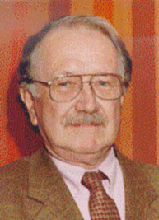 I am sad to report the death of David Adams, aged 85 years, on 22nd March 2016.
I am sad to report the death of David Adams, aged 85 years, on 22nd March 2016.
David was a giant in American Studies. Appointed Assistant Lecturer in History at the University College of North Staffordshire at Keele in 1957, he became Lecturer in American Studies at Keele University in 1961, Senior Lecturer in 1965 and Professor in 1972. David led the founding of Keele’s American Studies programme in 1961, the establishment of the American Studies Department in 1965 and was Head of the Department until 1993. Keele’s David Bruce Centre for American Studies in 1969 was an achievement of particular import to David Adams and he remained its Director until 1996, shortly before he retired from the University to become Emeritus Professor in 1997.
His connection with Keele was more than departmental. Britain’s first post-war university incorporated the vision of creating more than a virtual intellectual community on its fine 600+ acre estate, investing in housing stock that would result in staff and students living on site. David invested fully in this vision, initially residing in the attic rooms of Keele Hall, and living in various homes on campus over the next 55 years, before moving with his wife Sarah to a cottage in Keele, the Staffordshire village that gives the university its name. Keele’s campus remains beautiful, and it is a particular pleasure to me that David and Sarah have enjoyed the trees I have been able to place in its arboretum.
David Adams and his Keele colleagues brought me to American Studies. I think I could still find my notes from David Adams’ lecture on Chicago in the 1920s, which I attended almost 50 years ago. I remember some details: containing his story within the parentheses of the gangland murder of Dean O’Banion in his flower shop in 1924 and the St Valentine’s Day Massacre of 1929, David brought the history of prohibition to life with anecdotal energy without ever disregarding intellectual rigour. There was a striking description of O’Banion’s elaborate funeral, with its 26 flower-decorated trucks, a giant display in white roses ‘From Al’, the whole procession fronted and followed by police bands. Taking advantage of Keele’s progressive attitudes to student choice of degree subjects, I left Mathematics and entered American Studies.
Outside the lecture hall I found David on the staff list: MA (Cantab), AM (Yale) MA, DPhil (Oxon) looked pretty daunting to me, but he wasn’t. His primary interest was in the life and times of Franklin D. Roosevelt, and the New Deal, and the instant any callow undergraduate indicated the slightest awareness that FDR had been the longest-serving president David become their beaming friend. There were undoubtedly alternative keys turned by other students, but US domestic politics and history most engaged me and I was never much drawn to David’s other interest, twentieth century U.S. foreign policy. It was here, though, that David made his greatest published contribution, with the 25-volume series of Documents from the British Foreign Office Confidential Print (University Publications of America).
David Adams served on the Executive Committee of the British Association for American Studies, and as the BAAS representative on the Executive of the European Association for American Studies. The first conference of the American Politics Group was hosted by David Adams and John Lees at Keele University in January 1975. David was engaged in the various defences of American Studies that were mounted whenever the subject was threatened by government or university policy. But though his contribution to the American Studies community in institutional terms was highly significant, it was matched by his personal commitment to his students, a good will that did not cease at graduation. Sarah Adams confirms that ‘[o]ne of his joys was following the careers of former students and colleagues’. In my case David travelled to events I host at the British Library in London as long as he was able to – his support never stopped, and he never made any secret of his pride that I was one product of his teaching, and that he reckoned I had come out OK.
Awarded the OBE in 1997, the citation read: ‘Professor David Keith Adams. For services to North American studies in the U.K.’ In 2000 the University of Keele added its own Honorary DLitt to David’s awards.
David had rarely enjoyed good health. A couple of years ago he wrote with regrets that he would be unable to make Tony Badger’s Bryant Lecture (regrets sharpened by the fact that David’s undergraduate years had been spent at Clare College, of which Tony had gone on to become Master) since he could no longer travel to London – but he would read the lecture when it was available – ‘My grey cells like to still feel engaged with what is going on’.
A fall at home led to his admission to hospital and all David’s immediate family were able to visit over the brief period before his peaceful death.
Professor Phil Davies, Director of the Eccles Centre at the British Library
Archive